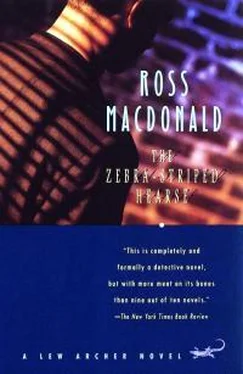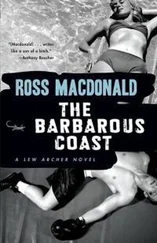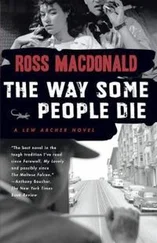Her face had darkened. She turned it away from me. “Why are you looking at me like that?”
“I’m trying to understand you.”
“Don’t bother. There’s nothing to understand. I’m a very simple person.”
“I was thinking that, too.”
“You make it sound like an insult.”
“No. I doubt that your friend Burke is quite so simple. That isn’t an insult, either.”
“What is it?”
“Call it a warning. If you were my daughter, and you’re young enough to be, I’d hate to see you fling yourself into this thing in a frantic hurry – merely because your father is against it.”
“That isn’t my reason. It’s a positive thing.”
“Whatever your reasons are, you could find yourself in water over your head.”
She looked out past the kelp beds where the ocean went dark and deep and the sharks lived out of sight.
“ ‘Hang your clothes on a hickory limb,’ ” she quoted, “ ‘but don’t go near the water.’ I’ve heard that before.”
“You could even keep your clothes on.”
She gave me another of her looks, her black Blackwell looks. “How dare you speak to me in that way!”
“The words came out. I let them.”
“You’re an insufferable man.”
“While I’m being insufferable, you may be able to clear up a small discrepancy for me. I noticed that the shaving kit in the bathroom has the initials B. C. on it. Those initials don’t go with the name Burke Damis.”
“I never noticed it.”
“Don’t you find it interesting?”
“No.” But the blood had drained out of her face and left it sallow. “I imagine it belonged to some previous guest. A lot of different people have used the beach house.”
“Name one with the initials B. C.”
“Bill Campbell,” she said quickly.
“Bill Campbell’s initials would be W. C. Who is Bill Campbell, by the way?”
“A friend of Father’s. I don’t know if he ever used the beach house or not.”
“Or if he ever existed?”
I’d pressed too hard, and lost her. She dismounted from the rail, smoothing down her skirt, and started away from me toward the beach house. I watched her go. No doubt she was a simple person, as she said, but I couldn’t fathom her.
I DROVE BACK up to the highway. Diagonally across the intersection, a large fading sign painted on the side of a roadside diner advertised Jumbo Shrimp. I could smell grease before I got out of the car.
The stout woman behind the counter looked as though she had spent her life waiting, but not for me. I sat in a booth by the front window, partly obscured by an unlit neon beer sign. She brought me a knife and fork, a glass of water, and a paper napkin. I was the only customer in the place.
“You want the shrimp special?”
“I’ll just have coffee, thanks.”
“That will cost you twenty cents,” she said severely, “without the food to go with it.”
She picked up the knife and fork and the paper napkin. I sat and nursed the coffee, keeping an eye on the blacktop road that led up from the beach.
The overcast was burning off. A sun like a small watery moon appeared behind it. The muffled horizon gradually cleared, and the sea changed from grey to greyish blue. The surf had begun to thump so hard I could hear it.
Two or three cars had come up from the cluster of beach houses, but there had been no sign of Harriet’s green Buick. I started in on my second cup of coffee. Refills were only ten cents.
A zebra-striped hearse with a broken headlight came in off the highway. It disgorged, from front and rear, four boys and two girls who all looked like siblings. Their hair, bleached by sun and peroxide, was long on the boys and short on the girls so that it was almost uniform. They wore blue sweatshirts over bathing suits. Their faces were brown and closed.
They came in and sat in a row at the counter, ordered six beers, drank them with hero sandwiches which the girls made out of French loaves and other provisions brought in in paper bags. They ate quietly and voraciously. From time to time, between bites, the largest boy, who carried himself like their leader, made a remark about big surf. He might have been talking about a tribal deity.
They rose in unison like a platoon, and marched out to their hearse. Two of the boys got into the front seat. The rest of them sat in the back beside the surfboards. One of the girls, the pretty one, made a face at me through the side window. For no good reason, I made a face back at her. The hearse turned down the blacktop toward the beach.
“Beach bums,” the woman behind the counter said.
She wasn’t talking to me. Having nursed two coffees for an hour, I may have been included in her epithet. The coffee, or the waiting, was beginning to make me nervous. I ordered a therapeutic beer and turned back to the window.
The woman went on talking to herself. “You’d think they’d have more respect, painting a hearse in stripes like that. They got no respect for the living or the dead. How they expect me to make a living, bringing in their own food? I don’t know what the world is coming to.”
Harriet’s car appeared, coming out of a tight curve, halfway up the slope. I saw when it reached the highway that she was driving and that her friend was in the seat beside her. He was wearing his grey suit, with a shirt and tie, and he bore a curious resemblance to those blank-faced dummies you see in the windows of men’s clothing stores. They turned south, toward Los Angeles.
I followed them down the highway. Malibu slowed them, and I was close on their tail as they passed through the shabby fringes of Pacific Palisades. They made a left turn onto Sunset. The light had changed when I reached the corner. By the time it changed in my favor, the Buick was far out of sight. I tried to make up the minutes I had lost, but the squealing curves of the Boulevard kept my speed down.
I remembered that the Blackwells lived in the hills off Sunset. On the chance that Harriet was on her way home, I turned in through the baronial gates of Bel Air. But I couldn’t find the Blackwell house, and had to go back to the hotel to ask directions.
It was visible from the door of the hotel bar. The white-coated barman pointed it out to me: a graceful Spanish mansion which stood at the top of the terraced slope. I gave the barman a dollar of Blackwell’s money and asked him if he knew the Colonel.
“I wouldn’t say I know him. He isn’t one of your talkative drinkers.”
“What kind of a drinker is he?”
“The silent type. My favorite type.”
I went back to my car and up the winding road to the hilltop house. The rose garden in front of it was contained like a conflagration by a clipped boxwood hedge. Harriet’s Buick was standing in the semicircular gravel drive.
I could see her father’s white head over the roof of the car. His voice carried all the way out to the road. I caught isolated words like sneak and scrounger.
When I got nearer I could see that Blackwell was carrying a double-barreled shotgun at the hip. Burke Damis got out of the car and spoke to him. I didn’t hear what he said, but the muzzle of the shotgun came up to the level of his chest. Damis reached for it.
The older man fell back a step. The level gun rested firmly at his shoulder. Damis took a step forward, thrusting out his chest as if he welcomed the threat of the gun.
“Go ahead and shoot me. It would fix you at least.”
“I warn you, you can press me so far and no farther.”
Damis laughed. “You ain’t seen nothing yet, old man.”
These things were being said as I climbed out of my car and walked toward them, slowly. I was afraid of jarring the precarious balance of the scene. It was very still on the hilltop. I could hear the sound of their breathing and other things besides: my feet crunching in the gravel, the low call of a mourning dove from the television antenna on the roof.
Читать дальше












